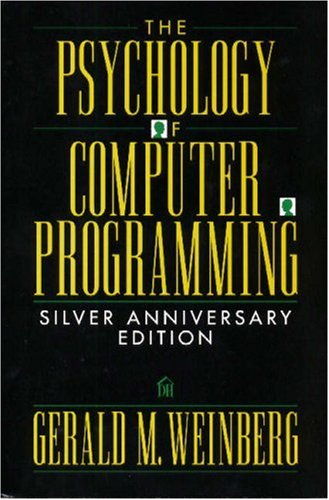Psychology of computer programming book download
Par pare sandi le dimanche, juillet 9 2017, 01:06 - Lien permanent
Psychology of computer programming by Gerald M. Weinberg


Psychology of computer programming book
Psychology of computer programming Gerald M. Weinberg ebook
ISBN: 0932633420, 9780932633422
Page: 299
Format: djvu
Publisher: Dorset House
Courses cover a range of subjects, including astronomy, biology, chemistry, computer programming, engineering, psychology, legal studies and philosophy. English; Mathematics; Computer Programming; Islamic Education Studies / Moral Studies. Egoless programming's roots lie in the book, “The Psychology of Computer Programming” by Jerry Weinburg, 1971. In fact, a successful reduction is merely translation from a high-level language (like psychology) to a low-level language (like a computer programming language), without any loss of detail. I wrote the first draft of The Psychology of Computer Programming. Plus Science : Physics; Chemistry; Biology; Computer Programming; Psychology/Sociology. In addition to Krebs makes a good argument, I think there are several other reasons why we might want to consider treating computer programming as a core part of the liberal arts education. Initially, the university will offer five courses online, covering topics including psychology, computer programming, and English common law. Tim will be talking about the absolute basics of computer programming, without any actual code (using plain English descriptions instead). Psychology of Computer Programming book download Download Psychology of Computer Programming Weinberg. As most software development teams know, frequent code reviews ensure the containment of poor code quality such as inefficiencies in unit-level design and lack of adherence to coding standards. Weinberg has spent the last 50 years transforming software organisations, and has co-authored many books, including The Psychology of Computer Programming and the Quality Software Management series. Many years ago I read "The Psychology of Computer Programming" first edition, and found it to be the best book that I had ever read about the field of computer programming. Weinburg describes a style of development environment relying heavily on peer reviews. Everyone ends up learning from their own mistakes and other people's mistakes.” – Jerry Weinberg, “The Psychology of Computer Programming”, 1971. Historically, the practice of code reviews existed in methodologies like RUP as both informal code they will find errors. Has anyone else found anything better?